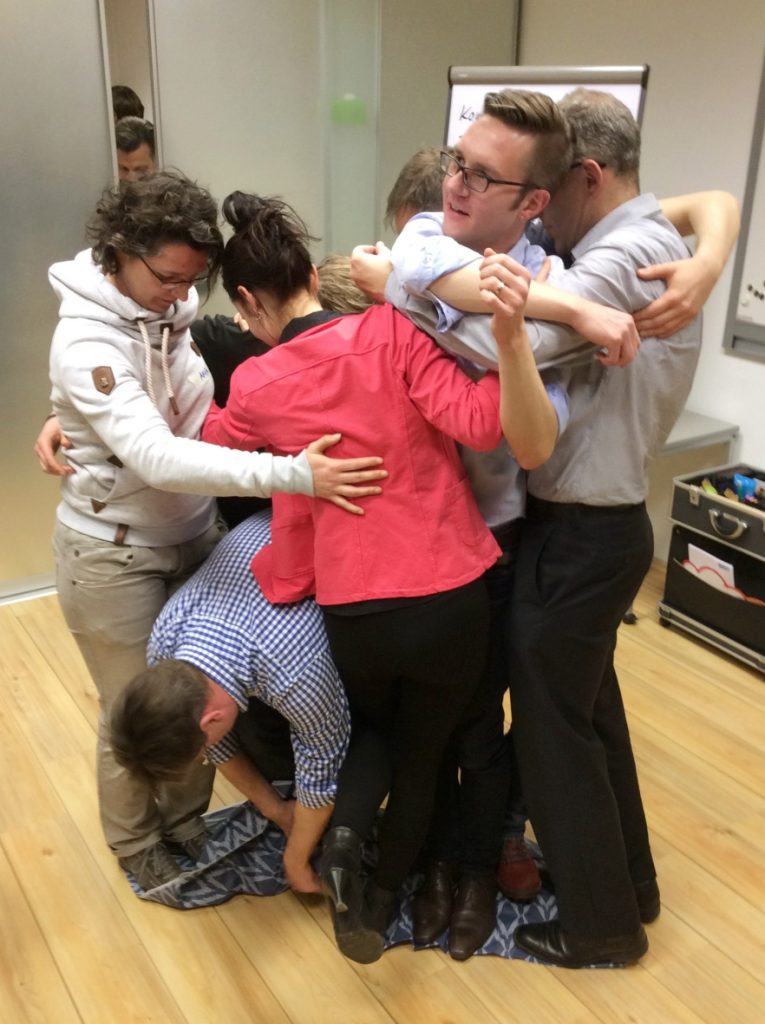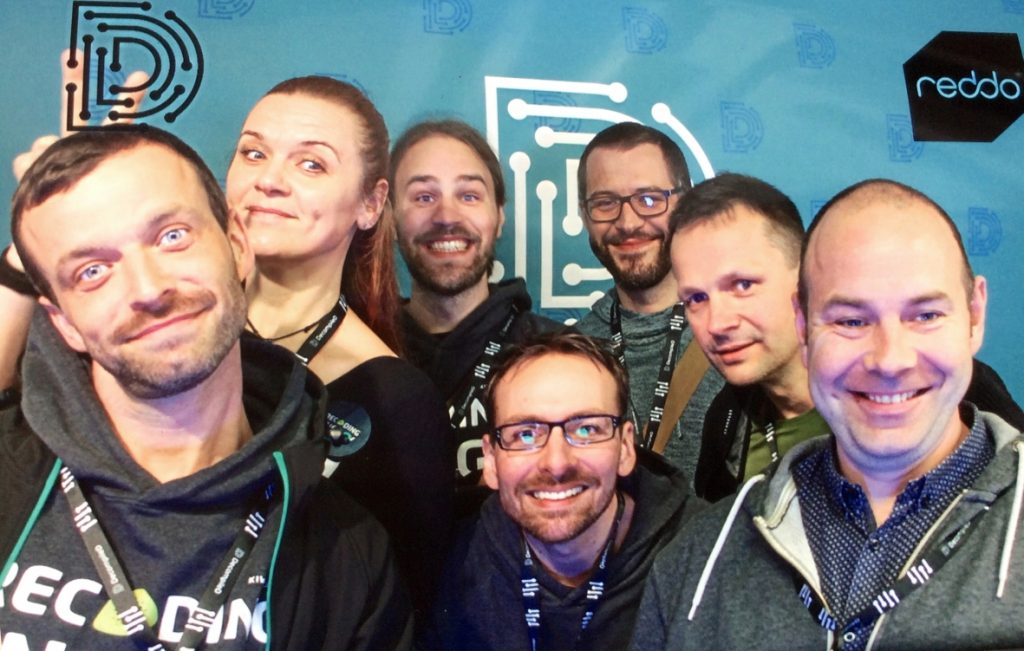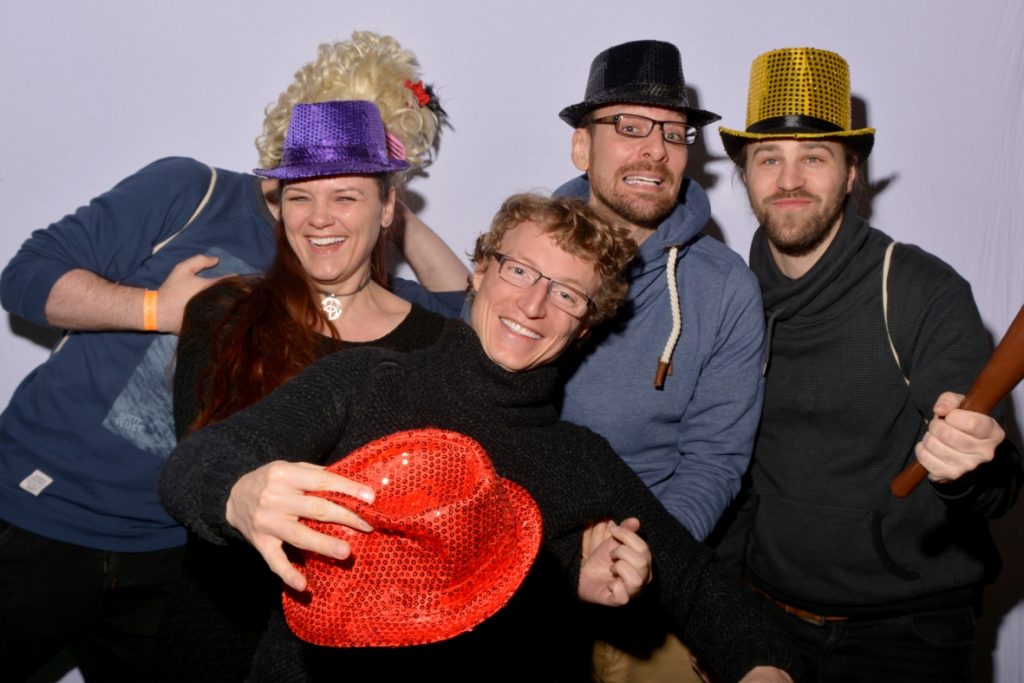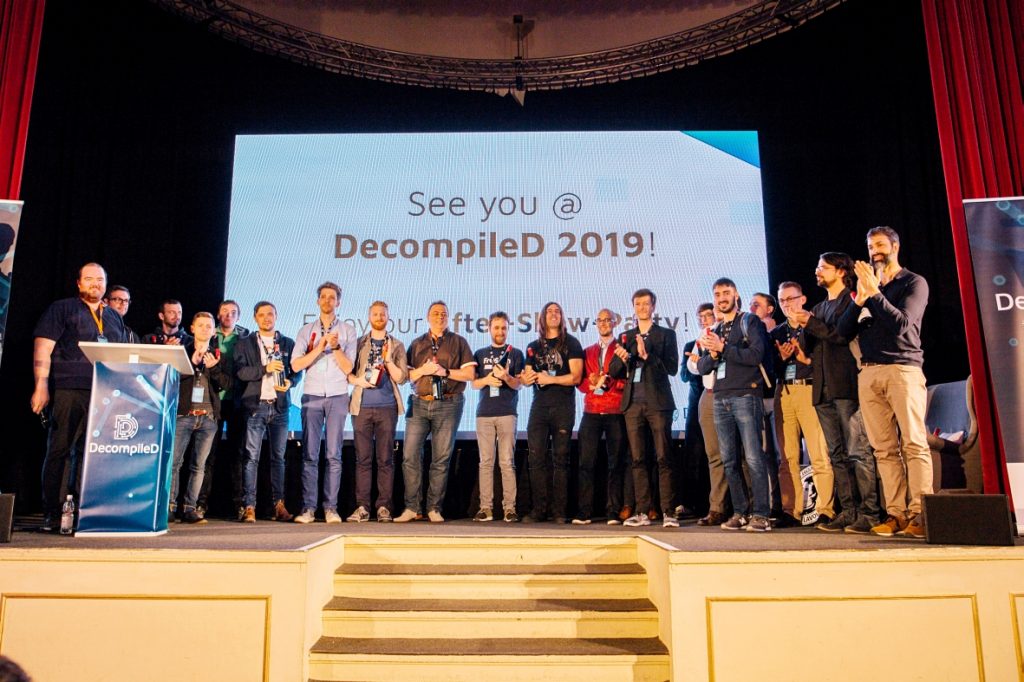
What’s up
For quite some time now I have been hearing more and more contradictory extreme positions on the topics of corporate structures and collaboration, which are important to me. Well-functioning and moderate models seem to be the commendable exception. As a coach and probably the second most curious person in the world, I naturally wondered why.
Then the DecompileD conference took place on April 4, 2018, where I really enjoyed every moment. From dawn till dawn. As I received many impulses and inquiries on similar topics again, it was clear that I finally had to sort my thoughts on this.
I’m gonna do that here.
Competition versus community
From various discussions, I have noticed that decision-makers often want to strongly regulate or prevent cross-company knowledge sharing. While questioning the reasons, I discovered various presumptions, e.g.: we already know everything; others know less; knowledge sharing only makes sense with those who know something better; information exchange is disguised industrial espionage or disguised enticement of employees; financial expenditure on knowledge sharing is always higher than the resulting gain etc.
Statements like these always confuse me, because they neither correspond to my values nor my experiences. Impressively, such assumptions often cannot be disproved with rational arguments. Perhaps because they do not refer to anything specific. And because they are often an expression of a destructive lack of understanding for the enthusiasm of others.

Agile events like the Barcamp or various Meetups in Dresden, Berlin and Leipzig are mental oases for me.
But even at some tech events like the DecompileD you don’t encounter such negative thoughts. I met interested people from various sectors, experienced a lot of openness and had a lot of conversations about wrong decisions and the derived learnings. There was a lively exchange of informationabout the use of tools in product development as well as pair programming-like coding. Everyone discussed on an equal footing, no matter whether recruiter, CEO, developer, product owner, software architect, QA manager, agile coach, founder, consultant… There was neither room nor need for counterproductive self-promotion, but there was for purposeful communication. (In this context I also remember the useful Q&A tool on DecompileD, which was used right after the sessions.) I feel extremely comfortable in such environments.
It is not without reason that humans in general are called social beings. People learn from each other – and they have to, since they couldn’t survive alone at the beginning of their lives. There are psychological studies that show a significant correlation between loneliness and health problems. So let’s just state this: People like company. (Exceptions confirm the rule.) This is nothing new. In addition, it’s very likely that a conference topic attracts exactly those people who are interested in it. Thanks, captain Obvious.
Okay, so what did we get here? A group of people who come together on the basis of shared interests. And they do it voluntarily. Right! And… we call that a community. This has been working for ages.
Surprisingly, these simple insights are often lost somewhere in everyday work. Companies are shaped by individuals making decisions that affect many other people, often without even knowing the people and/or real processes in that area. Combined with micro-management, this results in one of the dilemmas of conventional corporate structures: the more complex a problem and the more risky a decision is, the fewer people are involved; the simpler and more ordinary a task is, the more decision-makers are involved, unnecessarily. (Gebhard Borck described a very vivid example at Lean Around the Clock 2018.) Such patterns are inefficient and frustrating. And they lead to questionable self-fulfilling prophecies: no time for open spaces, communities of practice or similar formats. But there are plenty of meetings and the round-tables, often without real results. Improvements? No chance. Everyone’s annoyed by the same things. Always.
The magic words are knowledge transfer and participation. Both of these work better in a collaborative mode. The latter, in turn, should not be mistaken for a “love, peace and harmony” culture. Oppositeness can greatly promote successful cooperation, but it is often confused with competition.
And competition is not what communities are all about. The focus is on not stewing in your own juice and connecting with people with different experiences.
It’s great to have such passionate employees. And even better, if you let them decide and realize in their area of competence.
Roles & skills versus people & humans
Roles and process definitions seem to be very important for many companies. There may be various reasons for this and so it probably makes different kinds of sense.
However, some classic symptoms do make me wonder, e.g.: employees are described as resources; having an internal skill matrix is more important than a job offer; hiring decisions are made by a separate HR department and without team feedback or the number of certificates as the main reason for assessing an applicant.
Unfortunately, similar bad habits also exist on team level. For example, if teams are always reassembled at short intervals or if members of high-performance teams are separated from each other.
In such cases, decisions were again made on the basis of assumptions, such as “only the compilation of certain roles or competencies generates team performance” or “friends shouldn’t be working together.”
In fact, pure role and skill profile thinking does not improve anything in the real world.
At this point, I remember a relaxed conversation about working together successfully at the DecompileD Bar in the evening. Mirko (co-founder of DevBoost) summed up his experience as follows: „When I arrange to meet an applicant, I always say: ‘I don’t want to know first and foremost if you can handle everything. Instead, I want to know if we like each other.’ This often causes confusion, especially among young developers. But it’s quite obvious, nobody wants to be annoyed every day because they have to deal with people who don’t match them.” I’d sign that right away. (And by the way: Many people have already signed something similar. Just have a look at the Agile Manifesto.)

Successful companies have understood one thing: Whether employee or boss, software architect or coach, senior or junior – they all have one thing in common: they are humans. (At least most of them. I’ve shared offices with robots and dogs as well. Maybe they pass for colleagues, too.) Such companies do not look mechanically for skill sets, instead they find people who fit them. They make decisions in the areas which will be affected. They trust in their employees. They define success not only in terms of revenue and profit. And they solve problems when they occur, collaboratively. (If you need an example, take a look at sipgate’s learnings.)
Great teams perform well because the members enjoy working together and are collectively responsible for their products. And because people can use their knowledge and all their talents and abilities effectively – whether they learned them at university or by playing video games. It’s about humans who make mistakes and learn from them. They take care of each other. And they love what they do. (This is another topic in itself.)
The more fantastic that the interest in participatory, agile (as it works e.g. at InVision) and holistic approaches increases. This can be seen, for example, in the development of modern structures of collaboration beyond the founding of a company (Structure & Process is a good example). Discussions and field reports at community events also point this out (e.g. the talk by Stefan Queißer for ostec GmbH at the Agile Dresden Meetup in February 2018).
Anyone who wants to follow such a promising path should be aware that it will be a journey. Evolution takes time and always needs room for new ideas.
Plastic surgery versus natural growth
By “plastic surgery” in the corporate context I refer to interventions that are initiated under the assumption that they could quickly change things in a positive way but often do not have the desired effect. Typical examples are: double the number of people can develop or deliver twice as much or twice as fast; company culture improves by buying toys and creating a feelgood management department or all you need to solve a problem is a tool.
This corresponds to the classics I have encountered most frequently in everyday work: Successful start-ups meet an interested market and double their workforce in a short time. Pool table, Mate and coffee machine are a must-have, just because the competitors also offer these. And at last week’s conference the fancy Tool X was shown in action – we need that, too. (Cargo-Cult at it’s best.)
In the worst case, this mechanistic thinking also includes people. I have heard too often that Scrum Masters are primarily meeting facilitators and thus make teams faster. (Ouch.) I also received conventional job enquiries. The conversations revealed that of course I wouldn’t have anything to do with the management (except for reporting), because after all the management is not the problem – but the staff would need an introduction on how to do it. So they wanted to transform the coach into a tool, only for local optimization. That didn’t sound like fun.
Of course, no company exists in a “vacuum”. As responsibility for employees increases, so does the pressure to be financially successful. However, this is not a contradiction. Organic growth can be very helpful if you want to keep processes alive, retain an open culture and motivated people. And everything that happens in the company is per se part of the culture. With every new person, a potential piece of cultural change enters the company. And the more stable a well-working team is, the more likely it is to stay in top form.
In general, changes should have exactly one base: A straightforward answerable why. Especially discussions regarding the implementation of new tools should always focus on which problem shall solved with it. Otherwise decision-makers will probably become „tooligans“ (a matching pun I picked up at LATC18 conference).
The same applies to benefits. Even though I personally prefer table tennis to billiards and like Earl Grey more than mate, I really appreciate these kinds of benefits. However, they only work if they fit the people and in case the offer is meant seriously. Alibi benefit indicators are easy to reveal, e.g.: A dusty table tennis table, stored in the basement of the associated company three doors down. A circular mail while customers are on site, so that nobody gets “caught” having a break. A casual remark that a company can’t find people these days without „stuff like this“. Or, even worse, the expectation that no one will „complain“ any more because the company offers so much feelgood equipment. Benefits are not a replacement for solving problems. Otherwise, improvement is actively prevented.
In particular, natural growth and evolutionary development also means admitting to wrong decisions and changing direction. Of course, this should not be an impatient reflex. Sustainable changes do not happen by pushing a button.
Definition of Done and Definition of Fun
When companies reflect on why they don’t find good employees quickly enough, the discussion as to whether work must be fun starts at some point. This is always interesting. It is often argued that the benefits offered by many modern companies only increases expense while reducing performance. Or „fun“ is defined as entertainment, which is pure leisure pleasure: work is work and after all everyone is paid to do his job.
Fortunately, these statements have become increasingly rare. But they illustrate that extreme positions are generally not useful in the long term. Some startups turn into 24-hour businesses without being noticed. At some point it is normal not to go home anymore, drinks are already there and you can celebrate just as well with your colleagues. Other companies that have grown out of the startup-shoes extremely quickly copy seemingly proven ideas from global players to retain employees or recruit new ones, regardless of pool table, fancy coffee machine or in-house fitness courses.
Of course, everyone is primarily responsible for their own lives. Nevertheless, I think it totally makes sense to love what you do. (As a night owl I would never get out of bed in the morning otherwise.) We spend so much time of our lives working, why should we invest it badly? However, this does not mean that every company has to become a full-time and all-round entertainer.
My personal definition of fun is based more on needs and motivation (Mr. Maslow would perhaps be pleased): In general, people want to do meaningful things and need some variety. How do you measure that? Great products, nice colleagues, satisfied customers and direct feedback cross my mind first. On the realization level, this means first and foremost interesting tasks, lean processes and the experience of self-efficacy and appreciation.

From my point of view, this is where benefits come in: If they are genuine, I see them as a sign of appreciation. Only then do they boost the fun factor. After all, I wouldn’t want to party or play table tennis in an annoying environment or with people I don’t like.
Is having fun at work a luxury? Yes and no. Some of us live in societies where financial security or survival is not the main reason for deciding on a job. This cannot be taken for granted from a global perspective. But it should be.
After all, freedom of decision holds enormous potential: it implies intrinsic motivation. And highly motivated employees don’t just want to deliver something that works, they also want to create something great collaboratively. That’s exactly what brings us forward.
…which means
Communities are great. Interested people come together voluntarily to share and learn from each other on a specific topic. Synergies arise specifically because participants have different experiences from different settings. Exchange across team, company and national borders can advance each individual and each company. That’s why communities should be actively supported.
Market competition is important. However, it should take place at product level. If you want to extend competition to employees, you will probably lose, because employees are humans. They have a will of their own and do not want to be manipulated. We all have different talents and interests. It makes sense to use this potential instead of reducing people to roles or to skills that have been gained in professional life only.
Great companies find great people. Or the other way around. Money and other resources are still being burned to make companies „more visible“ to the outside world. But visibility is generated best by high-quality products, satisfied customers and competent employees who share their knowledge and spread their satisfaction all over the world.
Failures are not a reason for control, but an opportunity to learn. This requires the certainty of not being blamed and the courage to act transparently. Trust and appreciation are therefore the better basis for successful collaboration. If you treat colleagues like humans and expect them to do a good job, you will get back more.
Having fun at work means first and foremost loving what you do. The conditions for this need to be created in collaboration. Full-time entertainment is no substitute for solving problems.
Decisions should be based on causes rather than symptoms. A clear answer to the question of which problem should be solved precedes a good decision. The less knowledge and the higher the uncertainty and risk, the more qualified people should be involved in root cause analysis and in decision-making.
You can’t buy culture, it originates in everyday actions. Therefore, an artificial acceleration of growth at any price can destroy the best culture and the most innovative company.
Sustainable development takes time. It is not in contradiction to continuous improvement, but is based on it. Gradual adjustments are more helpful than waiting for the perfect time. The time is now.
It is people who can cause change, at any time. There is no proven solution that works for everyone. Every company needs to find its own way, which is paved by all the people involved.
And now for something completely different

Personally, I really like being part of an active and constantly growing community where the boundaries between networking, collaboration and friendship are often blurred. That’s not everyone’s cup of tea, for sure. For me it works pretty well as long as I am able to decide for myself when to share what with whom. If this is the case, I truly enjoy the train ride to the conference which feels like a school trip or the end of a conference which is informally extended until the next morning. Moments like this, shared with authentic people, feel real.
The IT sector in Dresden has grown considerably. You can find anything between startup and long-established company, from micro enterprise to enterprise group. There is a high demand for skilled people.
Nevertheless, in terms of community we are still in our infancy. Over the past few years, there has been a huge increase in Meetups and other communities, not just in IT. More intensified networking and more active exchange with other locations such as Leipzig and Berlin has already started.
If great formats like DecompileD will be established, new events will be launched and if we become even more international, we’re on the right track.

Pictures: DecompileD, Martin Waury, Fotobox, Anja H.